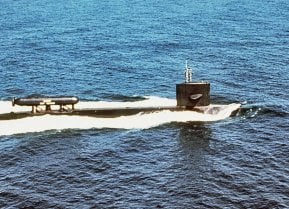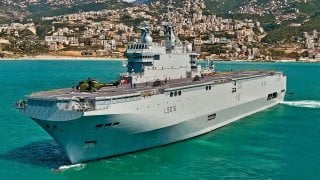Forgotten Fact: France Almost Sold 2 Helicopter Carriers to Russia
In 2010, Russia nearly secured a deal to purchase two Mistral-class helicopter carriers from France, which would have significantly bolstered its naval capabilities, particularly in Arctic operations.
What You Need to Know: In 2010, Russia nearly secured a deal to purchase two Mistral-class helicopter carriers from France, which would have significantly bolstered its naval capabilities, particularly in Arctic operations.

-The ships were designed to carry Kamov Ka-52 helicopters and had heated flight decks for Arctic missions. Despite U.S. and NATO objections, the deal was close to finalization, but France ultimately canceled it in 2015 due to Russia's annexation of Crimea and aggression in Ukraine.
-The cancellation cost France $444 million but saved the West from empowering Russia's naval ambitions, with the ships eventually sold to Egypt.
The Time the French Almost Sold Two Helicopter Carriers to Russia
Russia’s quest for naval development is boundless. Since the era of Peter the Great, Russian leaders have long envisioned their massive continental state becoming a dominant maritime power. It never really happened.
Even at the height of the Soviet Union, when Moscow’s challenge to the Western maritime democracies was at its apex, the most Russia could muster in terms of threatening U.S. Navy capabilities was in the Soviet Navy’s advanced submarine force.
In the 2000s, after Vladimir Putin and his nationalist-imperialist siloviki took power from the pro-Western President Boris Yeltsin, they committed the new government to restoring Russian greatness at home and abroad.
One of how the Putin government strove to make Russia great again was by reconstituting military capabilities that were either lost or significantly weakened by the collapse of the Soviet Union.
Relatedly, Putin dreamt of enhancing Russia’s naval capacity.
Russia Yearns to Be a Great Naval Power
The Russians have yearned to be a great naval power, replete with maritime aircraft capabilities. The best that Moscow has managed has been to humiliate themselves by clinging onto the ailing aircraft carrier, Admiral Kuznetsov. But Russian leaders have spoken about their desire to build real warships that can carry aircraft, whether it be full-blown aircraft carriers or helicopter carriers.
In fact, in 2010, Moscow was on the brink of finalizing a deal with France that would have seen France selling two advanced Mistral-class helicopter carriers. It took five years of back-and-forth between France, their allies, and Russia, but inevitably France nixed the deal in 2015 just before it was set to go into effect. They took a loss of upwards of $444 million (409 million euros) because of the last-minute decision to axe the deal.
The Specs
This was a serious upgrade for the Russian Navy’s surface fleet.
According to the design specifications, the Mistral-class helicopter carriers were specifically modified per Russian requests to carry Kamov Ka-52 Alligator attack helicopters, and the flight decks were to be heated. The heating of flight decks was a key feature for Arctic operations.

The Americans and their allies were upset with France because these helicopter carriers would have augmented what had been limited Russian surface fleet capabilities.
The Arctic Strategy
In 2008, the Russian government announced its intention to more fully develop and dominate, in other words: the Arctic region. A resource-rich area that had been largely untapped by the other Arctic powers, Moscow sensed an opportunity to take the High North before any of their competitors could. The Mistral-class helicopter carriers, with their heated decks, would have enhanced Russia’s impressive Arctic capabilities.
Even today, the West has dangerously ignored Russian ambitions in the Arctic, the one part of the world where Moscow could pose a threat to the United States and its partners.
The Context
Washington was upset with Paris for attempting to do the deal. After all, it was just two short years after Russia had invaded Georgia. What ultimately killed the deal was Russia’s annexation of Crimea and the move of Russian forces into Eastern Ukraine in 2014.
Had Moscow not done that, no amount of hectoring from France’s allies would likely have stopped the deal. The Russians would have been given two platforms that would have undoubtedly catapulted their naval capabilities, and allowed for Russian naval engineers to replicate those advanced French systems.
Oh, and the possession of advanced helicopter carriers would have probably helped Moscow to prioritize the development of new fifth-generation warplanes that could do vertical takeoff and landing (VTOL), like the American-built F-35 Lightning II can. The Japanese have shown the world that a helicopter carrier can easily become an aircraft carrier if the warplanes it is launching are VTOL.
Right now, the only fifth-generation plane that Russia possesses is the Sukhoi-built Su-57. It does not have VTOL capabilities. But, since the war in Ukraine started, Russia has investigated creating a fifth-generation plane that can do VTOL. Had Russia received these helicopter carriers, they might have expedited the research and development of VTOL warplanes.
It’s probably a good thing Russia did not receive these boats.
The Money Was Just Too Good
Turkey, the other major power in the Black Sea region, was quite apoplectic over the potential sale as that would have greatly upset the balance of power in the area. Interestingly, the Russians planned on naming one of the two ships Sevastopol, the name of the Russian naval base in the Black Sea.
France was upset they had to cancel the contract. Although, it was not a total financial loss for France. One of the ships was completed when the deal fell through in 2015. Another was nearly completed. The French sold the two boats to Egypt. The Mistral mishap shows how precarious international relations can be with arms sales. Sure, France doesn’t want to empower Russia any more than Turkey or the United States do. But the money is too good sometimes—even at the cost of trust among one’s allies.
About the Author
Brandon J. Weichert, a National Interest national security analyst, is a former Congressional staffer and geopolitical analyst who is a contributor at The Washington Times, the Asia Times, and The-Pipeline. He is the author of Winning Space: How America Remains a Superpower, Biohacked: China’s Race to Control Life, and The Shadow War: Iran’s Quest for Supremacy. His next book, A Disaster of Our Own Making: How the West Lost Ukraine, is due October 22 from Encounter Books. Weichert can be followed via Twitter @WeTheBrandon.
All images on the page come from Shutterstock or Creative Commons.
From the Vault
Russia Freaked Out: Why the U.S. Navy 'Unretired' the Iowa-Class Battleships
Battleship vs. Battlecruiser: Iowa-Class vs. Russia's Kirov-Class (Who Wins?)


